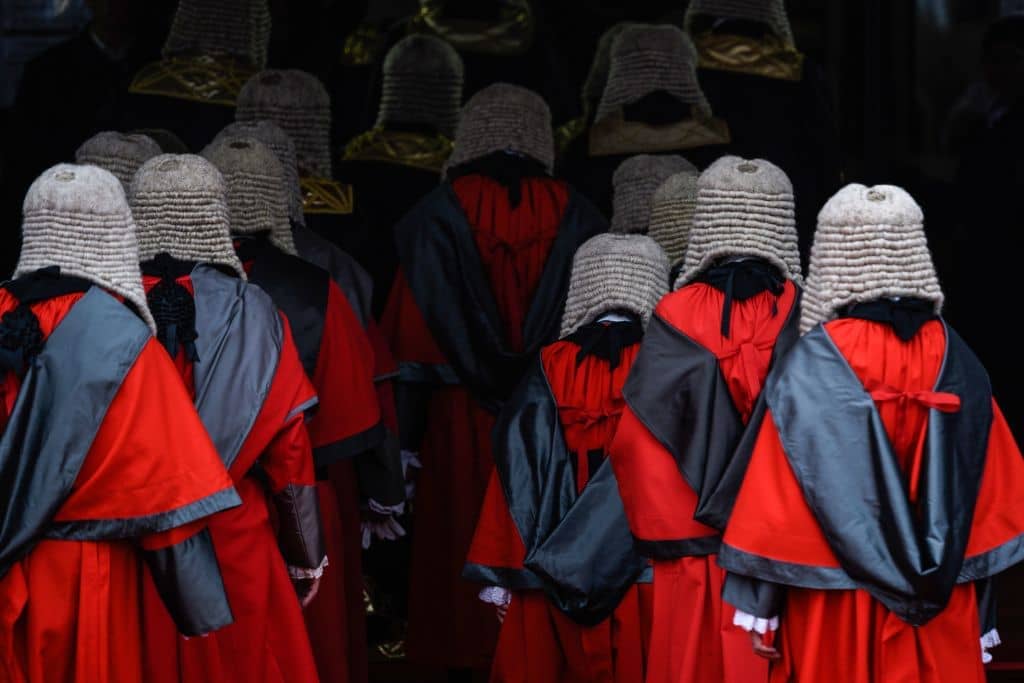The resignations of Lords Reed and Hodge from Hong Kong’s highest court is not much of a surprise, except perhaps to those who did not realise that serving British judges still administered justice in the territory. Their decision to quit follows soon after the Foreign Secretary, Liz Truss, decided to withdraw government support for the continued presence of serving British judges in Hong Kong. It marks the end of a long association between the British judiciary and Hong Kong which goes back to the 19th century, and is the inevitable conclusion of the ongoing crackdown on civil liberties there, which shows no signs of slackening.
When Hong Kong was handed over to the People’s Republic of China in 1997, the territory’s court of last resort became the Court of Final Appeal (CFA), which superseded the Judicial Committee of the Privy Council. But in a bid to bolster confidence in Hong Kong’s legal system, provision was made for foreign judges from Commonwealth jurisdictions to be appointed to the CFA on a non-permanent renewable basis.
Almost all of the non-permanent foreign justices are retired; but exceptionally, under an informal understanding from 1997, two serving British judges have been made available to the Hong Kong government for appointment. In addition, there are currently six retired British judges on the Court, more than half of its complement of foreign judges.
It is a long-established tradition for British lawyers and judges to fill legal appointments in other common law jurisdictions. The London-based Judicial Committee of the Privy Council, today in practice synonymous with the UK Supreme Court, serves as the court of final appeal for a dozen Commonwealth countries: when it hears appeals from these countries, it sits as a domestic court of those jurisdictions, and not as a British court.
These arrangements can make sense: the common law transcends boundaries, and legal principles established in Westminster Hall centuries ago still apply to countries on every continent. By hiring foreign lawyers as judges or by using foreign courts as their highest court, smaller common law jurisdictions can bolster confidence in their judicial systems and cut down on costs, whilst for Britain such arrangements bolster its international links and soft power.
But the situation in Hong Kong is very different. The enactment of the National Security Law (NSL) in 2020 has been followed by an unprecedented crackdown on civil and political liberties. Opposition lawmakers have been disqualified and jailed; independent media has been shut down; protests have been violently dispersed. Hundreds have been arrested under the NSL’s deliberately vague provisions; many defendants have been held without bail since 2020.
This puts British judges in a bind. As judges, they have an obligation to faithfully interpret and enforce laws, even ones with which they disagree. The rule of law would mean little if judges systematically substituted their preferences for those enacted by their polity. But there comes a point where the laws in question constitute such an assault on fundamental values, as the NSL undoubtedly does, that judges cannot in good conscience enforce them. Under those circumstances, the only honourable course is to resign, lest they be seen as siding with tyranny.
Equally, the presence of serving British judges on Hong Kong’s highest court has put the British government in a bind. Allowing British judges to serve on a Hong Kong court does not mean that the British government endorses the current situation in Hong Kong — as its robust response to the passage of the NSL clearly shows — but it risks being interpreted as such. The resignation of the British judges puts an end to the risk of any such misapprehension.
There were respectable arguments for the continued presence of the British judges. Part of the hesitation over the issue stems from the fact that there is a perception that, although the presence of foreign judges may serve to legitimise China’s crackdown in Hong Kong, the absence of foreign judges would make things even worse. At least, the thinking goes, the presence of British judges forces the territory’s puppet government to maintain a minimum of semblance of rule of law.
But given the current state of affairs and the direction of travel in Hong Kong, it has become clear that the city’s legal system has reached a point of no return. Between the NSL and the increasingly lawless behaviour of its government, there could really be one conclusion, and that is the one the Foreign Secretary and Lord Reed have now reached.






Comments